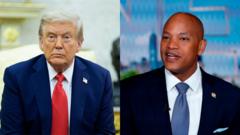The Grand Théâtre de Dakar recently attempted to enforce a ban on wigs, hair extensions, and skin-lightening products, aiming to promote "Pan-African values" and preserve cultural integrity. However, the decree issued by Serigne Fall Guèye, the theatre's director, was met with swift public outcry and deemed invasive. Critics, including feminist groups, viewed the order as a form of policing women’s choices under the guise of cultural pride.
The backlash revealed tensions surrounding gender inequality, particularly in a government where only four out of 25 officials are women, raising eyebrows about the removal of the Ministry of Women. Social media platforms erupted with remarks condemning the ban as sexist, leading to Guèye’s quick reversal of the policy just one day later due to intensified pressure.
Political analyst Fatoumata Ba stated, "This isn’t just about wigs. It’s about a broader power play, a form of identity imposition." Despite the support for the ban from a small group heralding it as a leap toward cultural dignity, most felt it reduced significant issues to mere physical appearances.
Feminist analyst Henriette Niang Kandé voiced her concerns in a viral post about the economic and practical reasons behind beauty choices. Sociologist Mame Diarra Thiam emphasized that true cultural affirmation goes beyond appearances and requires addressing educational and economic inequalities.
While the wig ban is now lifted, it has opened the door to ongoing discussions about personal freedom, identity, and the implications of post-colonial narratives in Senegal. This incident not only revealed cracks in the current political landscape but also ignited a conversation about who truly determines cultural authenticity in the region. The debate is far from over, and the issues it raises remain deeply significant in Senegalese society.
The backlash revealed tensions surrounding gender inequality, particularly in a government where only four out of 25 officials are women, raising eyebrows about the removal of the Ministry of Women. Social media platforms erupted with remarks condemning the ban as sexist, leading to Guèye’s quick reversal of the policy just one day later due to intensified pressure.
Political analyst Fatoumata Ba stated, "This isn’t just about wigs. It’s about a broader power play, a form of identity imposition." Despite the support for the ban from a small group heralding it as a leap toward cultural dignity, most felt it reduced significant issues to mere physical appearances.
Feminist analyst Henriette Niang Kandé voiced her concerns in a viral post about the economic and practical reasons behind beauty choices. Sociologist Mame Diarra Thiam emphasized that true cultural affirmation goes beyond appearances and requires addressing educational and economic inequalities.
While the wig ban is now lifted, it has opened the door to ongoing discussions about personal freedom, identity, and the implications of post-colonial narratives in Senegal. This incident not only revealed cracks in the current political landscape but also ignited a conversation about who truly determines cultural authenticity in the region. The debate is far from over, and the issues it raises remain deeply significant in Senegalese society.



















